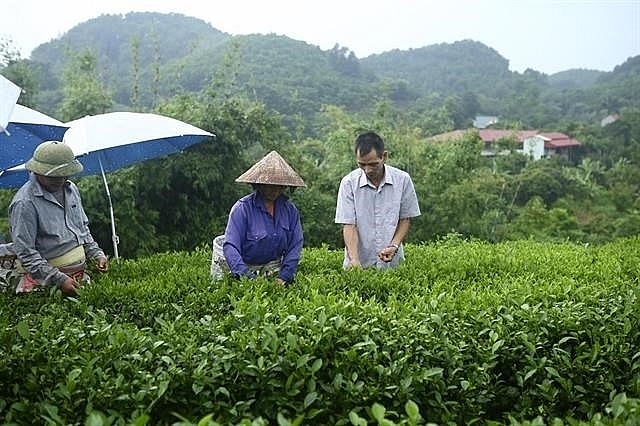Loans lift farmers in Thai Nguyen out of poverty
 |
| Vu Tri Long (R) picks tea with his employees (Photo: VNA) |
Now, sitting in a spacious house in the middle of his tea and venison farm, he can barely hide his happiness and pride.
Long said the transformation was thanks to loans from the fund for employment of the Vietnam Bank for Social Policies – Thai Nguyen Branch.
In 2002, when Long’s family was still very poor, he borrowed 3 million VND (130 USD) from the bank. He used the money to purchase a couple of cows. By 2005, he had a herd of nearly 30 cows worth 400 million VND (17,300 USD).
But between 2007 and 2009, beef prices fell sharply, leaving Long’s family in a dire financial situation.
Not at all discouraged, he decided to take out another loan from the bank to start growing tea and raising deer.
After starting with three stags, now he has 26. Each year he earns about 250-300 million VND (10,800-13,000 USD) in profits.
Long is not the only one who has benefited from the bank's loans.
Vu Thi Hanh, a 58-year-old resident of Tuong Quan Village in Hoa Thuong Commune, Dong Hy District, was also able to grow a household business thanks to the loans.
Hanh borrowed 44 million VND (1,900 USD) in 2018 to buy cages and set up a chicken farm.
Now, she raises 8,000 chickens and supplies chickens to small traders across the northern region – from Lang Son, Cao Bang, to Bac Giang and Hanoi, earning about 100 million VND (4,300 USD) in the past year.
Long believes that the loans from the Vietnam Bank for Social Policies are the most effective loans for farmers.
In Song Cau Town, local farmers used to plant midland tea because it was all they could afford. It would sell for 70,000-80,000 VND (3-3.40 USD) per kilo.
Now, thanks to support from the bank, Long said local residents were confident enough to plant more valuable varieties and set up a watering system – a vital step in the quest to grow quality tea.
The new cross-bred tea sells for 300,000-500,000 VND (13-21.5 USD) per kilo.
“The loans are meaningful for us," said Long. "They offer us many advantages such as simple procedures, no mortgages, low interest rates and long borrowing terms."
Nguyen Thi Muoi, deputy director of the Dong Hy District's branch of Vietnam Bank for Social Policies, said the town now has about 400ha of tea farms. Every year, it supplies tonnes of dried tea of different kinds.
The more valuable tea trees have helped many households escape from poverty, she said.
Muoi said that despite their positive impact, the loans can currently meet just 60 percent of farmers' needs because the local budget is limited.
Muoi proposed the Vietnam Bank for Social Policies – Thai Nguyen Branch provide supplementary credit capital, especially for poor and near-poor households.
Le Van Hong, deputy director of the branch, said the loan programme is important and meaningful.
It has contributed to implementing the national programme on poverty reduction and reducing the rate of unemployment, Hong said.
Thousands of workers have benefited from the loans. In recent years, the loans have also helped revive traditional villages.
The developed farms help create jobs for rural women and people with disabilities, improving living standards in many poor areas.
“The programme’s effect was recognised by local authorities and residents, but the capital for loans is still limited so it has not satisfied all of the demand for jobs in rural areas," said Hong.
Moving forward, the bank will co-operate with provincial Department of Labour, Invalids and Social Affairs to supervise the use of the loans and assess the results of the programme.
The latest report by the Vietnam Bank for Social Polices showed that at the end of May this year, the total fund for job creation jobs was 16.9 trillion VND (732 million USD). Nearly 800,000 people have found jobs thanks to loans from the bank.
What the stars mean:
★ Poor ★ ★ Promising ★★★ Good ★★★★ Very good ★★★★★ Exceptional
Related Contents
Latest News
More News
- Protect what’s next: towards a future free from meningococcal group B disease (December 05, 2025 | 18:00)
- New ILO report offers policy recommendations for disability inclusion (December 04, 2025 | 15:18)
- Maternal job loss may affect children’s mental health, research shows (December 03, 2025 | 19:11)
- Women lead Vietnam’s shift to climate-resilient agriculture (December 03, 2025 | 19:10)
- Experts highlight unpaid care work as key barrier to gender equality (December 03, 2025 | 15:15)
- Opportunities and inequalities for women workers in Vietnam's garment industry (December 03, 2025 | 09:00)
- Vietjet flights carry love to devastated central region (November 28, 2025 | 11:35)
- New initiative to boost the fight against domestic violence (November 26, 2025 | 10:00)
- South Korea funds IOM relief for Vietnam’s typhoon-affected communities (November 24, 2025 | 15:33)
- AI and human-centred values set to shape the future of HR in Vietnam (November 21, 2025 | 18:04)

 Tag:
Tag:




















 Mobile Version
Mobile Version